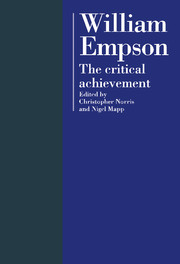Book contents
- Frontmatter
- Contents
- Contributors
- Foreword
- 1 Introduction: Empson as literary theorist: from Ambiguity to Complex Words and beyond
- 2 Empsonian honesty and the beginnings of individualism
- 3 Empson, Leavis, and the challenge of Milton
- 4 Empson's Satan: an ambiguous character of the seventh type
- 5 Compacted doctrines: Empson and the meanings of words
- 6 Figural narrative and plot construction: Empson on pastoral
- 7 More lurid figures: de Man reading Empson
- 8 Fool and pharmakon
- 9 William Empson's cosmicomics
- 10 Empson as teacher: the Sheffield years
- References
- Index
5 - Compacted doctrines: Empson and the meanings of words
Published online by Cambridge University Press: 01 June 2011
- Frontmatter
- Contents
- Contributors
- Foreword
- 1 Introduction: Empson as literary theorist: from Ambiguity to Complex Words and beyond
- 2 Empsonian honesty and the beginnings of individualism
- 3 Empson, Leavis, and the challenge of Milton
- 4 Empson's Satan: an ambiguous character of the seventh type
- 5 Compacted doctrines: Empson and the meanings of words
- 6 Figural narrative and plot construction: Empson on pastoral
- 7 More lurid figures: de Man reading Empson
- 8 Fool and pharmakon
- 9 William Empson's cosmicomics
- 10 Empson as teacher: the Sheffield years
- References
- Index
Summary
The primary aim is to clear up confusion, so the author describes not only the varieties of meaning in a word but the various controversies in which they get used. Also he recognises that these different meanings within one word are liable to interact, so that they form ‘compacted doctrines’, as when native was taken to imply ‘all subjected peoples are biologically inferior’; and he decides that many of our common words regularly tempt us to accept wrong beliefs, usually political ones.
(Empson, 1987a, p. 184)Coming across this passage for the first time, a casual reader might assume that this is someone writing about William Empson's The Structure of Complex Words. But in fact it is Empson himself, reviewing Raymond Williams's Keywords for the New York Review of Books in October 1977.
Besides the term ‘keywords’ itself, someone looking for likeness between the two books might highlight the shared idea of analysable structures of lexical meaning (especially the sense of embedded or compacted social doctrines inherent in the histories of words). There is also a common interest in the strengths - but also the limitations - of the Oxford English Dictionary (often referred to by Empson under its name at the time of first publication, in instalments, between 1884 and 1928: the New English Dictionary (NED)). Williams approvingly cites Empson's assessment of the Dictionary as a ‘majestic object’ (1983, p. 39); and for both writers, any work on the historical meanings of words is heavily dependent on it.
- Type
- Chapter
- Information
- William EmpsonThe Critical Achievement, pp. 170 - 195Publisher: Cambridge University PressPrint publication year: 1993
- 2
- Cited by



